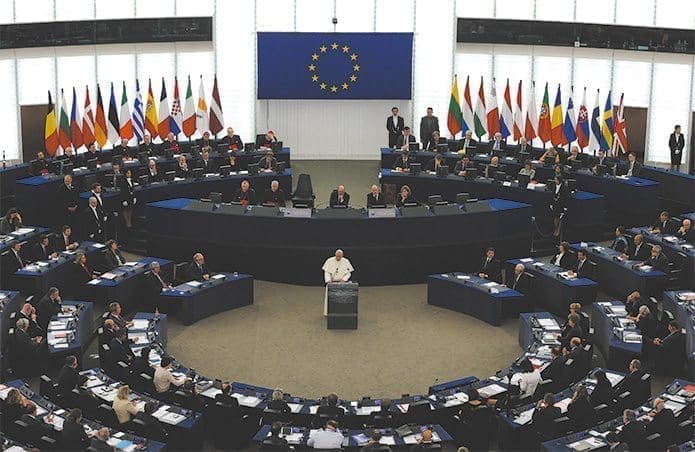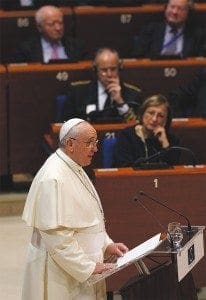 Pope Francis addresses the European Parliament in Strasbourg, France, Nov. 25. (CNS photo/Paul Haring) See POPE-EUROPARLIAMENT Nov. 25, 2014.
Pope Francis addresses the European Parliament in Strasbourg, France, Nov. 25. (CNS photo/Paul Haring) See POPE-EUROPARLIAMENT Nov. 25, 2014. France
Pope calls European Parliament to rejuvenate ‘grandmother’ Europe
By CINDY WOODEN, Catholic News Service | Published December 11, 2014
STRASBOURG, France (CNS)—The 77-year-old grandson of European immigrants to Argentina, Pope Francis urged the European Parliament to value the continent’s faiths and recuperate a sense of responsibility for the common good to rejuvenate Europe’s social, political and economic life.
“In many quarters we encounter a general impression of weariness and aging, of a Europe which is now a ‘grandmother,’ no longer fertile and vibrant,” he said Nov. 25. In too many cases, he said, the Judeo-Christian values and the humanist ideals that inspired the continental drive toward unity seem to have been replaced by “the bureaucratic technicalities of its institutions.”
Pope Francis, the first non-European pope in almost 1,300 years, was scheduled to spend less than four hours in Strasbourg visiting only the European Parliament and the Council of Europe. It was the shortest foreign papal trip ever and the first that did not feature at least one visit to a church.
Because it was organized strictly as a visit to the European institutions, the pope traveled to and from the airport in a closed car, not the popemobile. Along the route from the airport, scattered groups of a few people waited at the intersections with smartphones or cameras in their hands. There were plenty of French police lining the route, but the only significant groups of bystanders were at the tram stops.
Instead of making a pastoral visit, Pope Francis went to the heart of European unity and bureaucracy: the European Parliament, the legislative arm of the 28-member European Union; and the Council of Europe, an organization of 47 countries formed to promote democracy, human rights and the rule of law on the continent.
A few parliamentarians objected to the pope’s visit, saying it violated the separation of church and state. But Martin Schulz, the parliament’s president, told the pope his words “carry enormous weight not only because you are the spiritual leader of more than 1 billion believers. Your words carry enormous weight because they speak to everyone” and because “the issues you raise concern everyone.”
“Your words,” he told the pope, “provide counsel and direction in times of confusion.”
The only other pope to visit the European Parliament was St. John Paul II in 1988, a year before the Berlin Wall fell and marked the beginning of the end of a Europe divided into democratic West and communist East.
Despite the expansion of democracy and the incorporation of more countries into the European Union, Pope Francis told the parliament, “Europe seems to give the impression of being somewhat elderly and haggard, feeling less and less a protagonist in a world which frequently regards it with aloofness, mistrust and even, at times, suspicion.”
But strength is needed, he said, to defend the democracy dreamt of for so long. The continent’s democracies, the pope said, “must not be allowed to collapse under the pressure of multinational interests which are not universal, which weaken them and turn them into uniform systems of economic power at the service of unseen empires.”
Giving new life to the European project, he said, “depends on the recovery of the vital connection” between transcendent values and attention to the talents of Europe’s peoples and their concrete needs. “A Europe that is no longer open to the transcendent dimension of life is a Europe which risks slowly losing its own soul and that ‘humanistic spirit’ which it still loves and defends.”
European Union discussions are filled with references to human rights, but, the pope said, the idea of duties that go along with rights seem to be largely absent. “As a result, the rights of the individual are upheld, without regard for the fact that each human being is part of a social context wherein his or her rights and duties are bound up with those of others and with the common good of society itself.”
Even worse, he said, the most basic right—the right to life—is denied to many, including the unborn, the terminally ill and the elderly. “There are still too many situations in which human beings are treated as objects whose conception, configuration and utility can be programmed and who can then be discarded when no longer useful due to weakness, illness or old age.”
The selfish live with “an opulence” that is not sustainable and is indifferent to others, particularly the poor, he said. Economic, trade and employment policies seem dictated by technical and financial considerations to such an extent that “men and women risk being reduced to mere cogs in a machine.”
In addition, he said, too many of Europe’s citizens face active discouragement from expressing their religious convictions, too many of them go hungry and even more “lack the work which confers dignity.”
The original inspiration for European unity was the “transcendent dignity” of the human person, a dignity that endowed each person with inalienable rights, which could be respected most fully in a democracy, in peace and with special concern to help the weakest members of the community and the world, the pope said.
In the parliamentary chambers he also denounced “the many instances of injustice and persecution which daily afflict religious minorities, and Christians in particular, in various parts of our world.” He urged attention to the plight of those facing “barbaric acts of violence” because of their faith. “They are evicted from their homes and native lands, sold as slaves, killed, beheaded, crucified or burned alive under the shameful and complicit silence of so many.”
Christianity, he told the parliamentarians, not only helped forge the Europe of history, but it continues to offer values and services, particularly in education, that can provide a firm foundation for a renewed future.
Protection of the environment, an agriculture policy that respects farmers and the land, improving employment rates and handling migration are particularly urgent, concrete problems that require a response honoring the transcendent dignity of the human person and recognizing the realities of this world, he said.
As the Italian government continues to decry a lack of European Union solidarity and assistance with the thousands of migrants who cross the Mediterranean seeking freedom and a better life in Europe, the pope insisted the response to migration must be continent-wide.
“We cannot allow the Mediterranean to become a vast cemetery,” he said, referring to the thousands who have drowned trying to cross from northern Africa on rickety boats.
Pope Francis insisted: “The time has come to work together in building a Europe which revolves not around the economy, but around the sacredness of the human person, around inalienable values.”